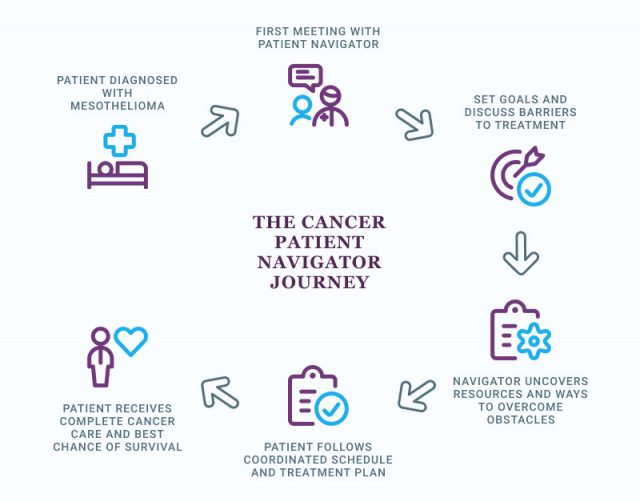A Cancer Patient’s Guide to the Benefits of a Patient Navigator
Patient navigators guide patients through treatment and manage roadblocks to receiving complete care. Navigators are trained professionals with backgrounds in nursing, financial aid, social work and more. Accredited cancer centers typically offer coordination services from navigators at no cost.
What Is a Cancer Patient Navigator?
A cancer patient navigator is a health care worker who guides patients through their medical treatment by assisting with everyday challenges such as financial coverage, transportation and scheduling. Their job is to make cancer care coordination easy and seamless.
Patient navigators can either be nurses or nonclinical staff. They often have varied backgrounds and education. Some are social workers or patient advocates, but they may also be health counselors, physical therapists, financial analysts, chaplains and more.
Cancer care has become increasingly complex, and mesothelioma patients shouldn’t navigate the health care maze alone. Cancer patient navigators offer peace of mind for patients by coordinating the best care possible without losing precious time getting stuck in the details.
How to Find a Patient Navigator
In many cases, there is no need to find a patient navigator on your own. If available, your treating physician will connect you with a navigator who will work with you until your cancer care journey is complete. In other cases, you may wish to reach out to a patient navigator agency that specializes in mesothelioma cancer.
What to Look for in a Cancer Patient Navigator
A skilled mesothelioma patient navigator will have an acute understanding of the health care system and insurance procedures. They should also have excellent communication and organizational skills and display a sense of compassion and attention to detail during their initial discussion with you.

Benefits of a Patient Navigator for Cancer Patients
Working with a mesothelioma patient navigator is usually free. Treatment facilities make patient navigators available as a benefit to everyone receiving care.
Navigators also have a proven track record of increasing adherence to treatment plans. Without obstacles such as financial burdens or travel distance, patients are free to carry out their entire treatment, improving their mesothelioma prognosis.
- Travel and lodging
- Financial support resources
- Treatment scheduling
- Clinical trial enrollment
- Nutritional planning
- Emotional support
- Caregiver resources
- Assisted living facility information
- Patient advocacy groups
- Explaining confusing jargon
- Highlighting recent research
Having access to a nurse navigator means you never have to worry about accidentally missing an appointment or unknowingly losing access to a new mesothelioma treatment. The nurse navigator’s role is to support you at every step and advocate for your care, providing an opportunity for the best outcomes.
Mesothelioma Support Services of Patient Navigators
Because nurse navigators come from many different backgrounds, they can assist in a diverse range of fields. A specialized patient navigator who works exclusively with your type of cancer can provide unique benefits such as a diet plan, assistance enrolling in a mesothelioma clinical trial and the latest medical research data.
Emotional Support
Some patient navigators have a background in social work and can counsel you on the concerns and emotions you may have after your diagnosis. Navigators can also refer you to mental health professionals and arrange for additional treatment if needed.
Caregiver Support
Caregivers also benefit from the aid of a mesothelioma patient navigator. Navigators have access to many relief programs such as respite care services and adult day care. Most importantly, navigators shoulder the burden of coordinating and managing cancer treatment, freeing up more time for caregivers and their responsibilities.
Living Assistance
Some patients may need to assess their living arrangements and determine if they need home assistance. Mesothelioma patient navigators can perform this evaluation for you and connect you with services such as housekeeping, meal preparation and everyday errands.
If living at home is not viable, patient navigators will provide guidance and find living arrangements that match your lifestyle, budget and treatment needs. Finding the right assisted living facility or skilled nursing home can be difficult and time-consuming, but a navigator removes that stress by uncovering the best options for you.
Support Resources
Patients can also take advantage of these resources to connect with a nurse navigator or gather additional information on possible benefits.
How Does a Patient Navigator Help with Cancer Treatment?
After their first meeting with a patient, the navigator takes time to assess potential roadblocks and builds a plan for making treatment as easy as possible. Mesothelioma patient navigators will also provide check-ins during treatment and troubleshoot additional challenges.
Every patient is different, and the experience of cancer treatment is different for everyone, presenting unique roadblocks when they’re least expected. Some patients may have challenging living situations due to travel distance or lack of transportation. Others may have language barriers or difficulty with memory and organization.
It’s difficult to tell what someone’s specific challenges might be before they undergo treatment. However, cancer patient navigators maintain regular communication with the patient and their family throughout the whole process.
In addition to establishing treatment and follow-up appointments, navigators also work to break down the results of laboratory tests, radiology imaging and pathology results. Patients are often overwhelmed with new information during a doctor visit. Having a navigator explain it all a second time can be a significant relief.
During treatment, the patient navigator will investigate every avenue of financial savings. Prescription assistance is a standard service that helps patients pay for their medications and find pharmacies that match their needs. If a patient needs to travel and stay overnight for treatment, navigators will identify financial resources to lower the cost.
Patient navigators also function as a point of contact for your mesothelioma doctor. They will direct any questions or concerns they can’t address to your physician, bypassing the need for you to call the doctor’s office or mesothelioma treatment center.
Helping Cancer Patients Obtain Financial Aid
Navigators have a variety of ways to lower the cost of cancer treatment and related expenses. They work to guide patients through financial support programs and find the appropriate coverage based on each patient’s unique situation.
Cancer patient navigators will research every possible avenue of financial aid, from copayment assistance to grants provided by pharmaceutical companies.
For example, the Patient Access Network Foundation covers out-of-pocket expenses for Medicare Part D prescriptions, and the Merck Access Program pays for the immunotherapy drug pembrolizumab (Keytruda).
Some patient navigators specialize in financial aid and can help you find out if you qualify for lesser-known programs or public assistance. Additionally, navigators will simplify the application process for coverage from national foundations.
Compensation for Asbestos-Related Diseases
Patients diagnosed with mesothelioma and other asbestos-related diseases such as lung cancer, pleural thickening or asbestosis have an additional avenue of financial coverage. Patients who file a legal claim can receive compensation to help pay for medical expenses and related treatment costs.
 Do You or a Loved One Have Mesothelioma?
Do You or a Loved One Have Mesothelioma?